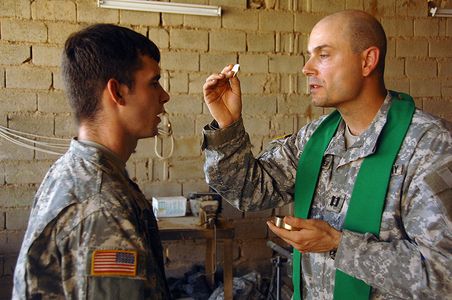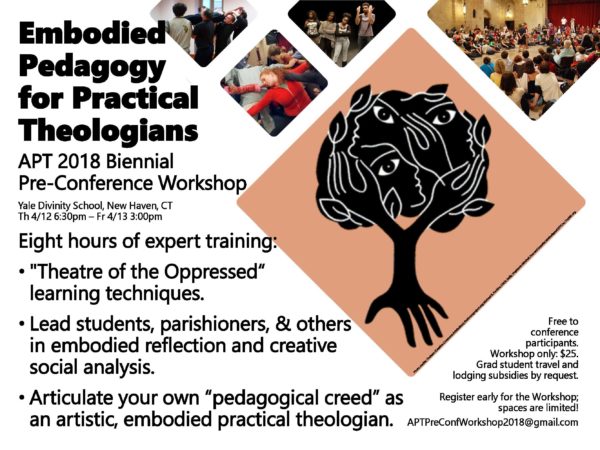Save the Date for the 9th Annual Center for Practical Theology Lecture!
You are warmly invited to
The Center for Practical Theology
9th Annual Lecture and Reception
Dean Bryan Stone will deliver the lecture on the topic of
“Evangelism, Religious Pluralism,
and the U.S. Military Chaplaincy”
Wednesday, October 12th, 2016
5:30 pm – 8:30 pm
Boston University School of Theology Community Center
(Lower level of School of Theology, located at 745 Comm. Ave, Boston, MA)
Reception begins at 5:30pm, with the lecture to follow.
Heavy hors d’oeuvres and drinks served.
Please email cpt@bu.edu with any questions.
We hope to see you there!
Association of Practical Theology in Oceania Annual Conference
 The Center for Practical Theology is committed to supporting the global scope of practical theological scholarship. We are excited to share news of the upcoming Annual Conference of the Association of Practical Theology in Oceania. More
The Center for Practical Theology is committed to supporting the global scope of practical theological scholarship. We are excited to share news of the upcoming Annual Conference of the Association of Practical Theology in Oceania. More
Congratulations to the 2018 Practical Theology PhD graduates!
The Center for Practical Theology is thrilled to celebrate the following 2018 graduates with PhDs in Practical Theology!
Congratulations to Drs. Benzenhafer, Ireland-Verwoerd, Lee, Theuring, and Williams!
 Dr. Holly Benzenhafer: "A Practical Theological Examination of Dream Studies and Christian Spirituality"
Dr. Holly Benzenhafer: "A Practical Theological Examination of Dream Studies and Christian Spirituality"

Dr. Francisca Ireland-Verwoerd - "John Wesley and Engaged Aesthetics: Transformative Christian Education"
 Dr. Min Hyoung Lee: "Parody and Pastiche in the Use of Popular Culture in the Evangelistic Practices of Korean Churches"
Dr. Min Hyoung Lee: "Parody and Pastiche in the Use of Popular Culture in the Evangelistic Practices of Korean Churches"

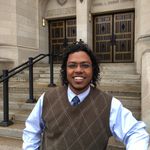 Dr. Montague Williams: "Youth Ministry, Race, and Martin Luther King, Jr.'s Beloved Community: A Practical Theological Critique of Post-racialism"
Dr. Montague Williams: "Youth Ministry, Race, and Martin Luther King, Jr.'s Beloved Community: A Practical Theological Critique of Post-racialism"
Moral Combat: How Sex Divided American Christians and Fractured American Politics (AAR Reading Religion Book Review)
 Kathryn House, a doctoral candidate in Practical Theology at BU School of Theology, recently reviewed Moral Combat: How Sex Divided American Christians and Fractured American Politics by R. Marie Griffith. Please see the beginning of House's review below and visit the Reading Religion website for the full review.
Kathryn House, a doctoral candidate in Practical Theology at BU School of Theology, recently reviewed Moral Combat: How Sex Divided American Christians and Fractured American Politics by R. Marie Griffith. Please see the beginning of House's review below and visit the Reading Religion website for the full review.
Reading Religion (RR) is an open book review website published by the American Academy of Religion (AAR). The site provides up-to-date coverage of scholarly publishing in religious studies, reviewed by scholars with special interest and/or expertise in the relevant subfields.
Moral Combat: How Sex Divided American Christians and Fractured American Politics. New York, NY: Basic Books, December 2017. 416 pages. $32.00. Hardcover. ISBN 9780465094752. Additional formats available from Basic Books.
Review excerpt
In Moral Combat: How Sex Divided American Christians and Fractured American Politics, Marie Griffith exposes fault lines in complicated 20th century American debates where sex, Christianity, and politics intersect. “The very meaning of sex, gender, and sexuality” were at the heart of these contentions, she wagers, and a key orienting concern would be whether tradition or change should be embraced on questions of gender, marriage, and sexual norms (xiii). Beginning with the 1920s, a decade of provocative change fueled by the women’s rights movement, Griffith follows a loose pattern of attending closely to one central debate and one or two significant figures per decade.
FIGS for Christ Initiative
The Center for Practical Theology is pleased to co-sponsor the FIGS for Christ Initiative (Faith & Finance, Inquiry & Identity, Guidance & Governance, Support & Sustainability), a series of workshops exploring collaboration, enrichment and growth for pastors and their lay leadership teams, as well as for contextual education students hoping to serve in pastoral or congregational settings. This endeavor will prepare future leaders for some of the challenges they may encounter. All are welcome!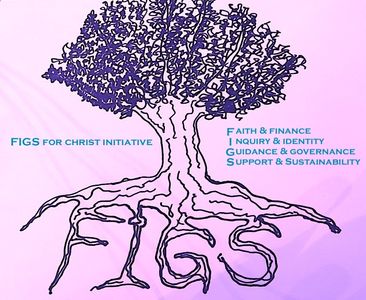
Date: Saturday May 12, 2018 and Saturday September 29, 2018
Time: 9am - 4pm
Location: First Baptist Church in Needham (MA)
RSVP at this link!
Each session includes:
- A morning and afternoon workshop led by experienced facilitators
- Opportunities for reflection through art, contemplative practice, and conversation
- Coffee/tea, lunch, and snacks
- Closing worship
These workshops will encourage and enable churches to nurture and tend the work of our congregations. We hope that clergy and lay leaders from individual congregations will attend as a team to identify issues and learn about strategies to confront them. In the attached flyer you will find more information on the FIGS Initiative, including workshop descriptions, speaker bios, the daily schedule, and sliding scale costs. Students not affiliated with a congregation and contextual education students may attend free of charge
We are grateful to the leadership of Rev. Daryn Stylianopoulos, Pastor of First Baptist Church in Needham and STH MDiv. '15. The Center for Practical Theology is thrilled to support FIGS as part of the School of Theology’s Stewarding Project and the Economic Challenges Facing Future Ministers (ECFFM) initiative.
You may RSVP for the FIGS Initiative at this link (registration link is also provided in the flyer below as well). Please contact figsforchrist@gmail.com with any questions. We hope to see you in May and September!

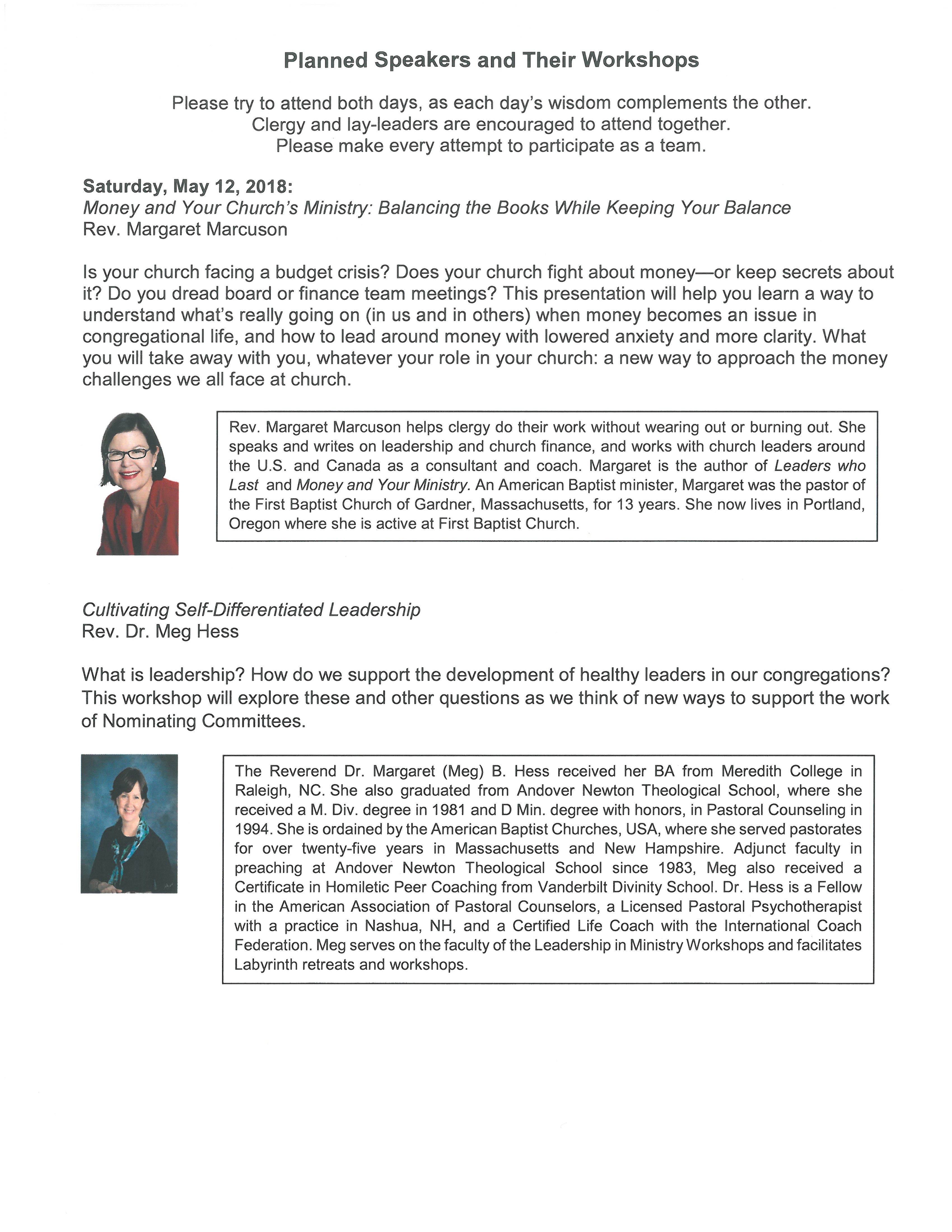


Rev. Dr. Michelle Walsh publishes Violent Trauma, Culture, and Power: An Interdisciplinary Study in Lived Religion
 Congratulations to Rev. Dr. Michelle Walsh (STH MDiv. '06, Practical Theology '14) on publishing Violent Trauma, Culture, and Power: An Interdisciplinary Study in Lived Religion. Rev. Dr. Walsh has worked for over 25 years in lay and professional urban ministry and social work and has directed two major mental health clinics. She currently is a Lecturer at the BU School of Social Work and has a private consulting practice for activists. Here, she offers a deeper understanding of how her world/sense impacted her research, her interdisciplinary influences, and the significance of a framework of lived religion for her book and for practical theology as a discipline. More
Congratulations to Rev. Dr. Michelle Walsh (STH MDiv. '06, Practical Theology '14) on publishing Violent Trauma, Culture, and Power: An Interdisciplinary Study in Lived Religion. Rev. Dr. Walsh has worked for over 25 years in lay and professional urban ministry and social work and has directed two major mental health clinics. She currently is a Lecturer at the BU School of Social Work and has a private consulting practice for activists. Here, she offers a deeper understanding of how her world/sense impacted her research, her interdisciplinary influences, and the significance of a framework of lived religion for her book and for practical theology as a discipline. More
The Center for Practical Theology Awarded $1.5 Million Grant for Vocational Discernment Innovation Hub
We are thrilled to share the news that The Center for Practical Theology has been awarded a $1.5 million five-year grant to create an innovation hub to foster creative vocational reflection in congregations today. This hub will focus on the important BUSTH constituency of mainline New England Protestant congregations. The grant awarded to BUSTH is one of 13 grants Lilly Endowment is making through Called to Lives of Meaning and Purpose, a $20 million national initiative designed to help US-based organizations as they work with congregations to build new ministries and lift up practices of discernment of vocation in Christian traditions. For more details on this exciting development, please see the full press release below. We look forward to the coming years of discernment, innovation, reflection, and partnership!
School of Theology Center for Practical Theology
Awarded Lilly Endowment Grant for Innovation Hub
January 29th, 2018
FOR IMMEDIATE RELEASE
Contact:
Kimberly Macdonald
Marketing & Communications Manager
617-358-1858
kmacd@bu.edu
BOSTON UNIVERSITY SCHOOL OF THEOLOGY CENTER FOR PRACTICAL THEOLOGY AWARDED LILLY ENDOWMENT GRANT FOR INNOVATION HUB
Boston, MA – January 29, 2018 – Boston University School of Theology (BUSTH) is pleased to announce Lilly Endowment Inc. has awarded BUSTH a $1.5 million five-year grant to create an innovation hub to foster creative vocational reflection in congregations today. This hub will focus on the important BUSTH constituency of mainline New England Protestant congregations. BUSTH officials intend to share resulting research with others across the United States.
The grant awarded to BUSTH is one of 13 grants Lilly Endowment is making through Called to Lives of Meaning and Purpose, a $20 million national initiative. The initiative is designed to help US-based organizations as they work with congregations to build new ministries and lift up practices of discernment of vocation in Christian traditions. At BUSTH, the Center for Practical Theology will be the locus of the grant project.
The BUSTH innovation hub will support the launching, testing, and refining of innovative ministries designed to support lives of meaning and purpose. A collaborative effort involving faculty across several disciplines, it will focus on both communal and personal dimensions of calling.
“We are excited to embark on this work as a partnership with congregations. While the language of vocation has deep roots in Christian traditions, contemporary contexts raise new questions about how to creatively imagine, articulate, discern, and embody vocations,” said Dr. Claire Wolfteich, Professor of Practical Theology and Spirituality Studies, and principal investigator and project director for the grant. “Our hope is that the project will have a transformative impact on congregations and communities while also bringing distinctive contributions to scholarship and to the ways in which we help form religious leaders here at BUSTH.”
The innovation hub will connect congregations and Boston University School of Theology faculty for mutual learning, support, and accountability over time, with the following objectives:
To foster theological reflection, articulation, contextual exploration, and study of Christian calling within and among congregations, with attention to individual and congregational calling;
To develop effective means of naming the pressing vocational questions, challenges, and aspirations in particular congregational contexts and analyzing those in light of related social, cultural, political, and economic forces/structures;
To create a generative, contemplative, and collaborative space for envisioning new and creative ministries that support vocational discernment and living, individually and communally;
To support the launching, testing, and refining of such ministries and to maximize the learning gained from such initiatives for the benefit of other congregations;
To integrate the work of the innovation hub in faculty research and publications, thereby increasing the practical impact of the work and making a scholarly practical theological contribution to existing literature on vocation, congregational studies, and church renewal;
To inform the teaching and formation of new pastoral leaders and theological educators through curricular innovation and mentoring shaped by the emerging wisdom of the innovation hub.
The resulting research of the innovation hub will be concurrently integrated in BUSTH faculty research and publications, thereby increasing the distribution of the work and making a defined scholarly contribution to existing literature on vocation, spirituality, congregational studies, and church renewal.
“We are very grateful to Lilly Endowment and to leaders in BUSTH for making this significant project possible,” said Rev. Dr. Mary Elizabeth Moore, Dean of the Boston University School of Theology. “By joining congregations and teacher-scholars, we seek to foster practices of vocational discernment and meaning-making, and to deepen our collective understanding of Christian vocation and the mission of the church. At a time when churches and individual Christians seek renewal, the project promises to bear abundant fruit.”
###
Since 1839, Boston University School of Theology has been preparing leaders to do good.
A seminary of the United Methodist Church, Boston University School of Theology is a robustly ecumenical institution that welcomes students from diverse faith traditions who are pursuing a wide range of vocations – parish ministry, conflict transformation, chaplaincy, campus ministry, administration, non-profit management, social work, teaching, justice advocacy, peacemaking, interfaith dialogue, and more. Our world-renowned faculty and strong heritage help students nurture their academic goals and realize any ministry imaginable. For more information, please visit www.bu.edu/sth.
Lilly Endowment Inc. is a national private philanthropic foundation created in 1937 by three members of the Lilly family – J. K. Lilly Sr. and sons J.K. Jr and Eli – through gifts of stock in their pharmaceutical business, Eli Lilly and Co. While those gifts remain the financial bedrock of the Endowment, the Endowment is a separate entity from the company, with a distinct governing board, staff and location. In keeping with the founders’ wishes, the Endowment supports the causes of community development, education and religion and maintains a special commitment to its hometown, Indianapolis, and home state, Indiana.
Employment Opportunity: Assistant Professor of Religious Education, Fordham University
Faculty Position: Religious Education
 Fordham University, a Catholic, Jesuit institution, invites applications for a full-time tenure track position at the Assistant Professor level in the Graduate School of Religion and Religious Education (GRE), beginning August 2018. Applications require a completed Ph.D. in Religious Education; or Theology, Practical Theology, Religion with a concentration in Religious Education; or equivalent. ABD applicants will be considered only if they will have earned the degree by May 2018. The successful candidate will have a thorough knowledge of religious education and catechesis as an interdisciplinary field of study, including an understanding of the history and practice of religious education and familiarity with scholarship at the intersection of the fields of religious studies/theology and education. Secondary expertise is expected in one or more of the following areas: pastoral theology and ministry – especially youth and young adult ministry, practical theology, intercultural ministry, leadership, or systematic theology. The position will involve online teaching, on campus teaching, student advising, scholarly productivity, as well as institutional and professional service. The successful candidate will also be involved in mentoring MA major papers, serving as the mentor or reader on dissertation committees for PhD in Religious Education students, and serving as a reader and possibly a mentor on dissertation and project committees for DMin students. The GRE seeks a highly qualified, diverse applicant pool and especially encourages members of underrepresented groups to apply. Successful candidates will have a knowledge of and commitment to the goals of Jesuit education.
Fordham University, a Catholic, Jesuit institution, invites applications for a full-time tenure track position at the Assistant Professor level in the Graduate School of Religion and Religious Education (GRE), beginning August 2018. Applications require a completed Ph.D. in Religious Education; or Theology, Practical Theology, Religion with a concentration in Religious Education; or equivalent. ABD applicants will be considered only if they will have earned the degree by May 2018. The successful candidate will have a thorough knowledge of religious education and catechesis as an interdisciplinary field of study, including an understanding of the history and practice of religious education and familiarity with scholarship at the intersection of the fields of religious studies/theology and education. Secondary expertise is expected in one or more of the following areas: pastoral theology and ministry – especially youth and young adult ministry, practical theology, intercultural ministry, leadership, or systematic theology. The position will involve online teaching, on campus teaching, student advising, scholarly productivity, as well as institutional and professional service. The successful candidate will also be involved in mentoring MA major papers, serving as the mentor or reader on dissertation committees for PhD in Religious Education students, and serving as a reader and possibly a mentor on dissertation and project committees for DMin students. The GRE seeks a highly qualified, diverse applicant pool and especially encourages members of underrepresented groups to apply. Successful candidates will have a knowledge of and commitment to the goals of Jesuit education.
Fordham is the Jesuit University of New York. It has residential campuses in the Bronx and Manhattan, a campus in West Harrison, NY, and its London Centre in Heythrop College in the United Kingdom. For more information see: https://www.fordham.edu/
For more information on the GRE see: https://www.fordham.edu/info/20380/graduate_school_of_religion_and_religious_education
Application Procedure
Submit a letter of application, curriculum vitae, a statement of teaching philosophy/interest, and three letters of recommendation along with contact phone numbers for references. Materials should be submitted electronically to horell@fordham.edu. Review of applications will begin January 30th and continue until the position is filled.
Postal Address:
GRE Faculty Search
Dr. Harold Horell, Search Chair
Fordham University
Graduate School of Religion and Religious Education
441 East Fordham Road
Keating Hall Room 303
Bronx, NY 10458
Email Address: horell@fordham.edu
Fordham University is an Equal Opportunity/Affirmative Action Institution.
APT Biennial Pre-Conference Workshop Opportunity: Embodied Pedagogy for Practical Theologians
If you're planning to attend the Association of Practical Theology’s Biennial (April 13-15), be sure to check out "Embodied Pedagogy for Practical Theologians," a pre-conference workshop. The workshop will be held Thursday, April 12, 6:30pm - Friday, April 13, 3:00pm. This is the evening and day leading up to the APT Biennial at Yale.
The main technique featured will be "Theatre of the Oppressed" ("TO"). Trainers from TOPLAB, the TO training center in NYC, will lead the workshop.
Organizers expect to have funds available to help graduate students cover the cost of transportation and of lodging for Thursday night (organizers expect to be able to cover these costs in their entirety). Breakfast and lunch on Friday are covered, and coffee available throughout. Coffee throughout, and breakfast & lunch on Fri, are covered for anyone participating in the workshop.
Space is limited, so please email APTPreConfWorkshop2018@gmail.com ASAP if interested!
WORKSHOP OUTLINE:
Thursday, 6:30-9:00PM
Introductions & Warm Up
• Games
o “Name Game”
o “Handshakes”
Exercises
• TOPLAB Definition of Oppression
Technique
• “Image of the Word”
o Arts
o Practical Theology
Exercise
• Set Community Agreements
Closing
• Share Writing Prompt: What is my ‘pedagogical creed’ as an embodied practical theology?
• Game: “One Word, One Hope”
Friday, 8:30-11:30AM
Warm Up
• Games:
o Community Building
o Microcosm of this morning’s technique (to be chosen based on context)
Exercise
• Revisit Community Agreements-- brief check in
• “Complete the Image” in pairs and small groups
Technique
• “A.C.T.O.R.” (Artist Creator Teacher Organizer Researcher, developed by Philippines Education Theater Alliance) – Part I. Theme: exploring the role of ACTOR in Practical Theology
Debrief
• Reflect on morning activities
• Set intentions for the afternoon
LUNCH
Friday, 12:30- 3:00PM
Warm-up
• Game: “Walking the Self and the Other”
Technique
• “A.C.T.O.R.” – Part II
Closing
• Debrief “A.C.T.O.R.” and connect with writing prompt
• Share information and resources as needed
• Game: “Close the Container”
STH Practical Theology at the Religious Education Association Annual Meeting
 Practical Theology faculty and doctoral candidates were well-represented at the Religious Education Association Annual Meeting in St. Louis, held November 3-5, 2017. Doctoral candidates Christine Eunjoo Park, Montague Williams, and Shinmyoung Kim presented, as did Dean Mary Elizabeth Moore. Congratulations to all who presented!
Practical Theology faculty and doctoral candidates were well-represented at the Religious Education Association Annual Meeting in St. Louis, held November 3-5, 2017. Doctoral candidates Christine Eunjoo Park, Montague Williams, and Shinmyoung Kim presented, as did Dean Mary Elizabeth Moore. Congratulations to all who presented!
Pictured left to right: Montague Williams, Christine Eunjoo Park, Shinmyoung Kim

Dr. Karelynne Gerber Ayayo on Thinking about Adoption: A Practical and Theological Handbook for Christians Discerning the Call to Parent by Adoption
We are excited to announce the publication of Dr. Karelynne Gerber Ayayo's (STH Practical Theology '03) recent monograph Thinking about Adoption: A Practical and Theological Handbook for Christians Discerning the Call to Parent by Adoption! Written with her husband Michael Ayayo, Thinking about Adoption offers biblical teaching and theological principles related to adoption, as well as introduces various types of adoption. Here, Dr. Ayayo shares more about what inspired the book, their interdisciplinary methodological approach, and how she hopes Thinking about Adoption can encourage deeper and richer theological reflection for individuals and communities.
1. What inspired your research on adoption?
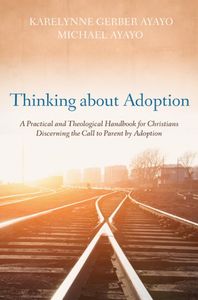
My research on adoption was the direct result of my own family’s discernment of a call to adopt and the subsequent roller coaster that we went through to make that happen. Even after my husband and I made the initial commitment to pursue parenting by adoption, we had no idea how to get started or what path to take. So I did what those of us in academia do best; I started to research and look for those resources that would tell us what we needed to know and help us weigh the various options.
I was surprised at how difficult it was to find theologically sound and practically helpful books to assist. I located works that engaged the theological doctrine of adoption, and while the theologian in me was stimulated, I was disappointed at how little interest they showed in the human practice of adoption. I found comprehensive “how to” books by adoption workers that offered loads of information about the adoption process, but they were overwhelmingly detailed. It was just too soon in our process to be reading about how to write a birth mother letter or what to pack to travel to China to retrieve a child. Additionally most did not address faith-based issues related to adoption practices. The specifically Christian adoption books tended to say things like Moses and Esther were adopted, and thus God has great plans for adopted children - an application that I found to be hermeneutically suspect. They reminded potential adoptive parents to pray a lot. That is sound advice, but I wanted theological reflection that went deeper.
I also read narratives detailing the adoption experiences that various Christian families had gone through. These were very inspiring, but they were also a bit frightening. They tended to be exceptional stories about people like the mother whose adoptive son got held up in the system such that she had to spend three years in Ukraine or the family that decided to adopt 19 children. I wanted to hear more “normal” adoption stories.
All of my searching convinced me of the need for a simple book that offered a practical theology of adoption meant to help families at the very beginning stage of discerning whether they were called to become adoptive parents, and if so, which path might be the best fit for them. Of course, our adoption process eventually led to the arrival of two little ones in our family within a span of five months so my plate was full. It took more than a decade before I was able to attend to the project in earnest!
2. How did you decide on your methodological approach?
It was clear to me from the very beginning that what was missing in the current literature were conversations across disciplines so my methodological approach would need to be interdisciplinary. Fortunately, between me and my husband, we had the right disciplines! My training is in biblical studies and practical theology. My husband already had training in pastoral ministry, and after we adopted our children, he went back for another degree in Social Work and has since worked in child welfare. As adoptive parents we were able to add our own personal experience into the mix, and we had easy access to a network of other adoptive parents. Thinking about Adoption lives at the intersection of all of these. As a result, the book marries historical and sociological information with biblical and theological insights, sections for readers to engage in personal reflection, and the stories of ten different adoptive families. It brings all of the pieces together.
3.You write in the Introduction, “Most importantly, we believed it was crucial to engage in solid theological reflection about adoption at every step. We wanted to meditate on biblical and theological principles alongside of practical concerns as we prayed to seek God’s voice with increasing clarity" (xvii). Were there particular biblical or theological principles that guided your theological reflections?
When people think about the Bible and adoption, they are drawn to the stories of Moses and Esther or to the places in the New Testament where the word adoption occurs. It takes more time and work to recognize other biblical and theological principles that come to bear on human adoption, but we discovered some that guided us in our own decisions and adoption experience and more that percolated in our minds in the years that followed. The hardest part of the book project really was deciding which biblical texts and theological principles were the most significant and relevant to each chapter and then condensing the insights into a very small space!
One particular insight came as we recognized that spiritual adoption exists as part of God’s economy of redemption. Adoption – both literal and spiritual - follows the fall. That means that for all the good of adoption, its existence is a testimony to the on-going presence of sin and brokenness in the world, and thus it must be engaged in a way that allows room for grief.
There were other biblical and theological lessons that were powerful to us. For instance, we found a motivation for adoption in the biblical principle of overflow (2 Cor. 1:3-5) rather than just locating a call to orphan care in a text like James 1:27. We recognized in part that the messiness of human adoption results from the fact that unlike spiritual adoption some members of the human adoption triad cannot operate as truly free agents in the process. And we were able to apply wisdom from Paul’s teaching about how churches can best care for widows in their midst to the complicated relationship between individuals and systems, particularly in relationship to intercountry adoption.
4. Do you have an audience in mind for Thinking about Adoption? How do you hope practical theologians will engage your work?
Thinking about Adoption was written with a popular audience in mind. The primary audience consists of Christians who are wondering whether they might be called to parent by adoption and who wish to consider the matter and their possible next steps in a thoughtful and theologically-informed manner. It is also intended for Christian adoption workers, Christian counselors, pastors, church adoption ministries, and others like them who seek a popular-level resource that they can use as they support families who are starting to think about adoption.
Due to the space limitations and the popular audience of Thinking about Adoption, we do not fully unpack all of the ideas that we introduce. There is space for other Christian thinkers and practical theologians to take the principles and insights into other specific scenarios and propose additional applications. I would love to continue the conversations with other Christians who are engaging such topics.
5. What’s next on your research agenda?
I am hoping to do further research and reflection in the area of ministry among those who are on the autism spectrum. I recently heard a paper that embraced hospitality as a lens through which to approach ministry to those with mental illness and I can see further applications of this idea specifically into the context of autism since this is another area where my family has personal experience.
